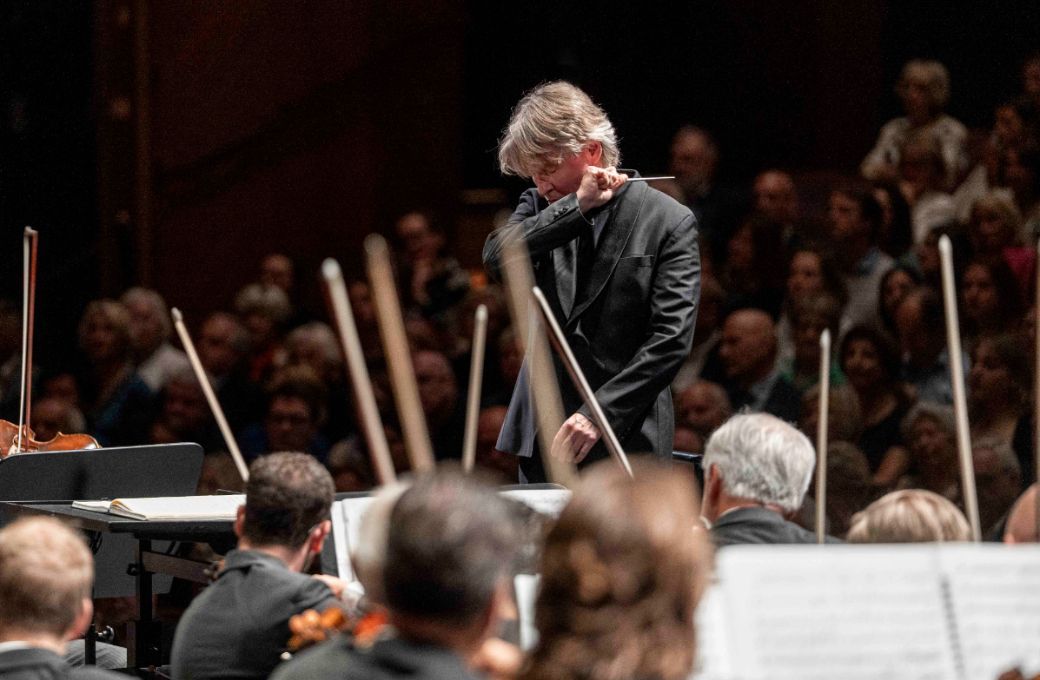The Vienna Philharmonic’s first concert at this year’s Salzburg Festival offered a formidable double bill: Stravinsky’s Oedipus Rex and Berlioz’s Symphonie fantastique, conducted by Esa-Pekka Salonen. On paper, it promised high drama, ritualistic grandeur and opulent orchestral color. And while the technical execution was beyond reproach – often breathtakingly so – the result was more intellectually stimulating than emotionally affecting.
Stravinsky’s Oedipus Rex, a neoclassical “opera-oratorio” from 1927, is deliberately distant, even dubbed cold by the composer himself. Performed in dead Latin with an arch narrator, it functions as ritual rather than drama. Christoph Waltz lent gravitas, narrating with measured understatement. Waltz was certainly a draw (who else but Salzburg would cast a Hollywood star to read the equivalent of stage directions?) and his inimitable presence reinforced the sense of ironic detachment that permeates the work.
The visual aspect – tableau vivant, not theater – underscored this sense of abstraction. A stage full of men: the male choir of the Wiener Singverein (sounding excellent), the Vienna Philharmonic (a sea of suits), and a cast of male soloists with one radiant exception. Marina Viotti, as Jocasta, swished onto the scene like a golden apparition, dressed as a Greek goddess and sounding like one too. Her luxe, velvety mezzo tones cut through the austerity with a sensuous warmth that the rest of the performance eschewed.
Allan Clayton, in the title role, likewise offered a compelling mix of vulnerability and strength. His flexible tenor lent Oedipus a fragility that made the character’s arc more human, if still remote. Michael Volle, a seasoned Kreon, sang with customary authority, though the dry, blocky orchestration occasionally swallowed his lower register. The choral forces were powerful and precise, executing Stravinsky’s brutal rhythms and articulating his sharply sculpted texts with ferocious discipline.
Musically, Oedipus Rex is Stravinsky at his most neoclassical: jagged edges, rhythmic cells, abrupt shifts – a kind of epic cartoon music, if cartoon music were cast in granite. Salonen shaped it with admirable control, navigating the austere terrain with unflappable poise. Yet for all its formal brilliance and sonic punch, the performance left me curiously unmoved. This was not just due to Stravinsky’s intention to keep us at arm’s length. It felt somehow like “man problems caused by men,” ritualized and reenacted by a mostly male cast in archaic language. With the exception of Viotti’s brief golden shimmer, it was hard to care deeply; perhaps the point, but still frustrating.

Berlioz’s lush and feverish Symphonie fantastique, a work bursting with opium dreams, romantic obsession and orchestral flamboyance, promised the catharsis that Oedipus Rex withholds. But Salonen approached it with the same forensic clarity he brought to Stravinsky, more magnifying glass than wildfire. This meant that every textural nuance and rhythmic filigree came through with crystalline precision. In this hall, with this orchestra, it was like seeing Berlioz’s intricate architecture in high-definition for the first time. The Philharmonic were a marvel – graceful, transparent, astonishingly unified. Le Bal lilted with gracious charm and their bowing alone was a masterclass in musical choreography.
But Salonen’s fastidiousness also flattened the emotional sweep. The third movement – usually an intimate, aching moment of reverie ushered in by solo double reeds – lost momentum. Stormy passions felt largely parsed rather than unleashed. Still, the finale was a revelation: vivid, biting and exhilarating, capturing the madness and brilliance of Berlioz’s vision. If only the rest of the symphony had scaled such heights.
One cannot help but admire the sheer professionalism and stamina on display. Salonen, stepping in for Lorenzo Viotti, conducted not only this matinee but also a full opera premiere later that same day. Throughout, his control, insight and intellectual rigor were on full display. Yet, the impression left was ultimately one of chilly brilliance rather than blazing inspiration.


